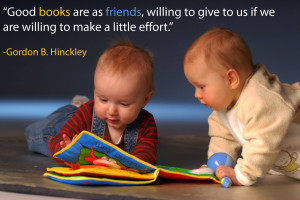Abraham Lincoln said of the Bible: “This Great Book … is the best gift God has given to man. All the good the Saviour gave to the world was communicated through this book. But for it we could not know right from wrong” (Speeches and Writings, 1859-1865 [1989], 628). [1]
But what do people think about the Bible today? According to a recent poll for the American Bible Society, 80 percent of respondents said they believe the Bible to be sacred literature. The survey, which was conducted by the Barna Group, found that 88 percent of Americans own a Bible—“and those same people own an average of 4.4 copies of the book.” [2]
…While it might not be surprising that religiously devoted Christians own Bibles, the study finds that 6 out of 10 Americans (59 percent) who have no faith or who identify as atheists own a Bible,” the researchers said. “Despite many aspects of society that are secularizing, penetration of scripture remains high in 2013. [2]
 Elder M. Russell Ballard, of the Quorum of the Twelve Apostles—the governing body of The Church of Jesus Christ of Latter-day Saints, sometimes inadvertently known as the Mormon Church—said that the coming forth of the Holy Bible was divinely inspired. He said:
Elder M. Russell Ballard, of the Quorum of the Twelve Apostles—the governing body of The Church of Jesus Christ of Latter-day Saints, sometimes inadvertently known as the Mormon Church—said that the coming forth of the Holy Bible was divinely inspired. He said:
It is not by chance or coincidence that we have the Bible today. Righteous individuals were prompted by the Spirit to record both the sacred things they saw and the inspired words they heard and spoke. Other devoted people were prompted to protect and preserve these records. Men like John Wycliffe, the courageous William Tyndale, and Johannes Gutenberg were prompted against much opposition to translate the Bible into language people could understand and to publish it in books people could read. I believe even the scholars of King James had spiritual promptings in their translation work.
The Dark Ages were dark because the light of the gospel was hidden from the people. They did not have the apostles or prophets, nor did they have access to the Bible. The clergy kept the scriptures secret and unavailable to the people. We owe much to the many brave martyrs and reformers like Martin Luther, John Calvin, and John Huss who demanded freedom to worship and common access to the holy books.
William Tyndale gave his life because he believed so deeply in the power of the Bible. He said, ‘The nature of God’s word is, that whosoever read it, or hear it reasoned and disputed before him, it will begin immediately to make him every day better and better, till he be grown into a perfect man’ (in S. Michael Wilcox, Fire in the Bones: William Tyndale—Martyr, Father of the English Bible [2004], xv). [1]
Despite the sacrifices made to bring the Bible to the common man, the Barna study found that only 13 percent of respondents said they read the Bible daily. However, 61 percent said they wish they read the Bible more. More than half—57 percent—said they read the Bible at least four times a year. The Rev. James Martin, a Jesuit priest and author of “The Jesuit Guide to (Almost) Everything,” said that the Bible can be intimidating. “There’s a tendency to think that if you read the Bible, you have to read it from start to finish. But when people do read the Bible, they don’t know where to begin,” he said. [2]
Although 4 in 10 adults said they just don’t have enough time to read the Bible, the researchers found “when they do find the time, the main reason for 53 percent of Bible readers to engage with scripture was to be closer to God.” [2]
Elder Ballard said the Bible teaches us the truths of God:
The Holy Bible is well named. It is holy because it teaches truth, holy because it warms us with its spirit, holy because it teaches us to know God and understand His dealings with men, and holy because it testifies throughout its pages of the Lord Jesus Christ. [1]
The study also found that 32 percent of the respondents said a lack of reading the Bible “is the main reason for what they see is a decline in the morals and values of America.” Although 49 percent said they didn’t think the Bible had much impact on American youth, the study found otherwise. “Four out of 10 [18 to 28 year olds] say they are interested in the Bible’s wisdom on dealing with illness and death, compared with about one-quarter of all adults (28 percent) who say the same,” the Barna researchers wrote. “More than one-third (35 percent) of [18 to 28 year olds] are interested in the Bible’s perspective on dating and relationships, and four out of 10 (42 percent) want to know what scripture says about parenting—both of those percentages are much higher than the norms.” [2]
Elder Ballard said of the Bible:
Honest, diligent study of the Bible does make us better and better, and we must ever remember the countless martyrs who knew of its power and who gave their lives that we may be able to find within its words the path to the eternal happiness and the peace of our Heavenly Father’s kingdom. [1]
